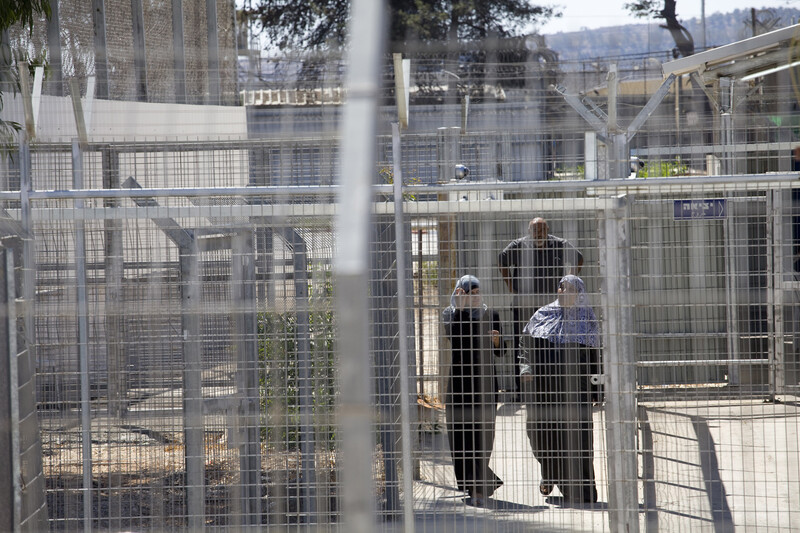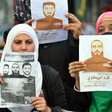The Electronic Intifada 25 February 2013

Palestinians enter Ofer military court near the occupied West Bank city of Ramallah.
ActiveStillsI have never been in a courtroom or a jail before now. I cannot draw a direct comparison to anything I know from the UK. But I am certain that the court hearing of Stop the Wall youth coordinator Hassan Karajah on 14 February at Jalameh military court near Haifa was not like anything I could have come across in the UK.
The hearing was held in what the sign declared to be Kishon Detention Home, otherwise known as Jalameh prison. There was nothing homey about it. As we waited outside for more than an hour, we watched men and women in Israeli Prison Service uniform come and go.
When we were allowed through into the first holding area, we waited again before we were allowed to proceed, one at a time, to the metal detector. You are not allowed to bring anything into the prison: no food, phone, bag, wallet or paper with writing on it. Luckily, we were warned about this. The security checks seemed to be arbitrary. My notepad (blank) was checked, but others weren’t. Our passports were held by the Israeli Prison Service while we were inside.
Through several padlocked doors and narrow, corrugated iron and wire fence corridors, the courtroom itself was small. It didn’t feel like a permanent structure. The chairs for us to sit on were plastic outdoor furniture; the judge’s desk stood on a platform with one leg hovering off the ground. The computer screen on which the text (in Hebrew) was transcribed for the defense and prosecution sat on a chair just in front of the platform, and was occasionally turned so it could be seen by defense and prosecution alike.
Translator jokes with staff
The defense must wear a light shirt, dark tie and smart trousers. This is not the case for the “prosecution,” who wore jeans and a T-shirt. The prosecution would not pass for such in any other situation. He was a civilian police investigator. He had no law qualification and had not been one of the interrogators on the case.
The hearings were held in Hebrew. They were translated by an Israeli soldier, who sat next to the detainee. Unfortunately, the translator was not always present or paying attention (she was seen joking with the prison staff), which leads to more than one detainee having to nudge the translator and ask what’s being said. Our translator said that she had difficulty understanding the translator’s Arabic.
There were four detainees’ hearings before Hassan’s. Each was short, lasting at most five or ten minutes, apparently for our benefit; normally they would be only three minutes. The treatment of these detainees varied, although each was led in by two prison guards and wore the same brown prison uniforms with one-size-fits-all plastic sandals — some had socks, some had coats. Initially the handcuffs were removed in the court, leaving clear red marks.
It was the same for the second detainee. However, there was one detainee, who was missing the index finger on his right hand. His cuffs were removed before he was taken into the room, but this was not done with any subtlety. We could see them being removed through the gap in the door.
We were later told by the lawyer that the two younger detainees were 17 years old — they had been playing with fireworks, which was how the finger was lost. The prosecution claimed they were making a Molotov cocktail that exploded prematurely, resulting in the lost finger. Either way, it did not look like it had had enough medical attention; it was swollen and poorly bandaged.
As with the later detainees, Hassan’s handcuffs were removed before he was brought into the room. Hassan’s family were unable to get permits to visit Israel on the short notice they had been given. There were no members of family present for any of the hearings and we were the only observers.
Messages
We had been given a message from family members to try and pass to Hassan, and as he walked in, some of this was successfully communicated. His face lit up and as he listened to his hearing, he made the peace sign and held his fist to his heart when his guard was not looking. More messages were passed through. Some of us held up paper with messages written on it. One guard sat between him and our main note-passer in an attempt to stop the messages getting through.
Hassan was initially taken out of the room in a hurry, only to be brought back in by his lawyer to have his sentence read and translated again. We were later told that this was because the first time around, the sentence had only been read in Hebrew, with no translation. This caused anger and annoyance in the room and his lawyer was repeatedly told to hurry up.
We were able to talk to the lawyer outside the court after the trial. Samer is a lawyer at Addameer, the prisoner support group, who worked for the last set of mass hunger strikers in Spring 2012. Samer was not allowed to see Hassan for the first 20 days of his incarceration.
Samer told us the conditions detainees are kept in: solitary confinement, a 2x2 meter cell of poor quality, a dirty mattress taking up the majority of the space. There is no natural light and no fresh air. The toilet is a hole in the ground with a flush that doesn’t work well and often backs up, sending feces into the room, further soiling the mattress. Hassan had not been given a Quran and had no way to pass the time. A relative of Hassan has told us that each day Hassan thinks about someone close to him as a survival tactic.
Shackled
The interrogation consists of spending 14 hours a day shackled to a chair, answering the same questions over and over again. This contravenes a detainee’s right to not to incriminate himself.
After Hassan’s first court hearing (there have been three to date) there was an appeal. The next morning, he was taken out of his cell at around 3am for interrogation. He was told by the guard that this was punishment for having appealed the hearing. He is under similar detention conditions as those of Arafat Jaradat, who died on Saturday while in Israeli custody either during or soon after interrogation.
During one hearing at Jalameh on 11 February, Hassan was told that the investigation was over and that he would be transferred to another prison. On arrival, he was held for a long time before being turned away and sent back. There had been a “mistake” and the investigation was not yet over. His lawyer had returned home, only to have to come back to inform Hassan of this change of heart by the Israeli Prison Service. Samer said that Hassan’s face fell in disappointment.
Health complaint worsens
Further to this treatment, Hassan has not had the correct medication for a nerve complaint suffered as a result of an accident. He has medication to help deal with the pain. In spite of the paperwork and medical information being provided to the court, Hassan has not been given the correct medication. The dosage is too low and as a result the complaint is returning, exacerbated by being kept in the cell — which is not big enough for him to stretch fully.
Hassan is still being held. There was an appeal hearing the following Monday, at which the 11-day extension was upheld. A further hearing was held at Jalameh prison yesterday, when he was given a further five-day extension.
The hearing was initially supposed to be at Salim Prison, near Jenin. However, when his family travelled there, leaving at 6am to arrive by 9:30am, they were told that his hearing had been moved back to Jamaleh prison in Israel. They were also informed that the reason Hassan’s hearing had been moved was because they had arrived.
Isabel Skrine is a British graduate volunteering on the Right to Education campaign run by Birzeit University in the West Bank.


